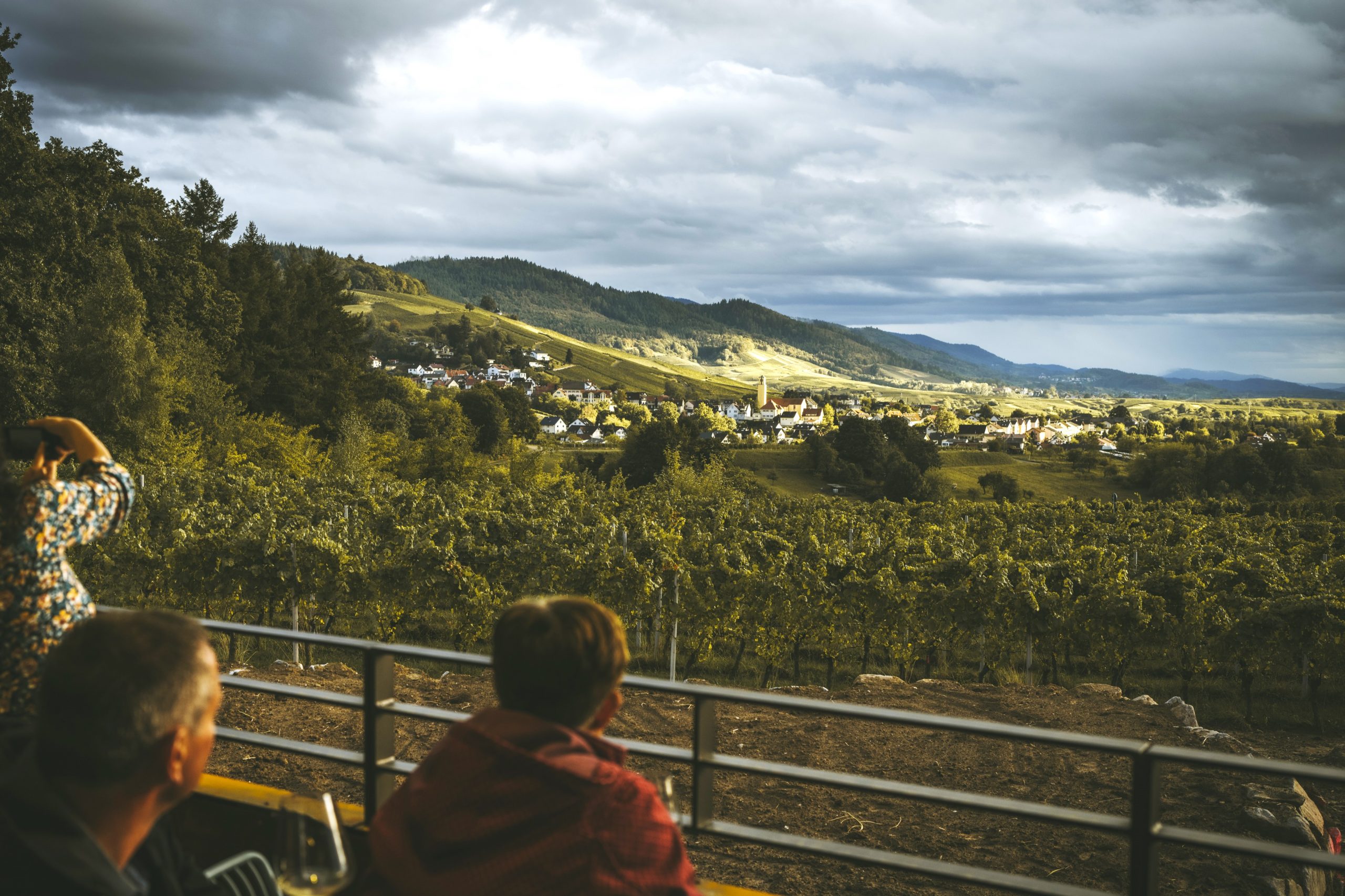
[In cooperation with the Kopp winery] When Johannes and Alina Kopp look out of the window, this is exactly what they see: the Black Forest, sometimes in a dramatic setting. The vines stretch right up to the trees, and one vineyard even lies in the middle of a forest clearing. We are in the southwest of Germany, a ten-minute drive from the famous spa town of Baden-Baden. Pinot Noir, known as Spätburgunder in Germany, is the most important grape variety in Johannes‘ and Alina‘s organically certified estate. And it is precisely these wines, which are now also available internationally, that I would like to take a closer look at.
Kopp winery – the favor of the moment
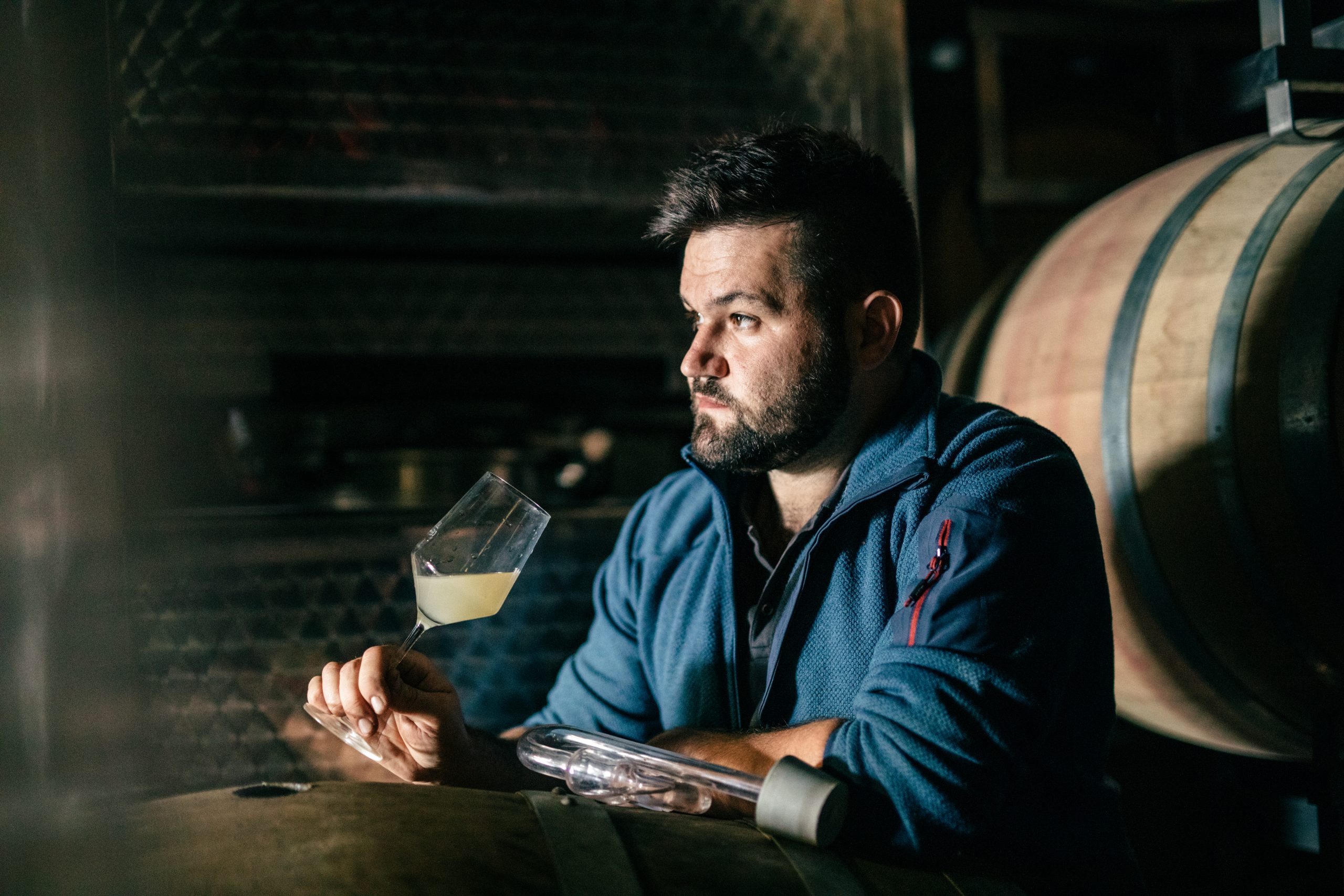
The winery’s cellar is well stocked with wooden barrels of various sizes. The building, on the other hand, looks almost brand new. I therefore ask Johannes Kopp (credits for the pictures go to the Kopp winery) whether it is a newly founded company. »Yes and no,« he replies somewhat sibylline, grinning. »Viticulture naturally plays a major role in our region. But most winegrowers are actually grape suppliers for the cooperatives and don’t make their own wine. My father was one of the first in the region to become completely self-employed in 1996. With just one hectare. As a mechanic, he didn’t know much about winemaking, but he trained further and did a year’s internship at the Huber winery.« Bernhard Huber, it should be noted, used to be one of the great red wine pioneers in Germany, and his work was groundbreaking.
There is another parallel between Kopp and Huber. Just like Julian Huber, Johannes Kopp had to take over the winery at a young age after the early death of his father. »I had already been to Australia at the time, but I had to drop out of university and learned to swim in cold water,« Johannes admits. The advantage on the other hand was that he had no obligation to simply carry on as before.
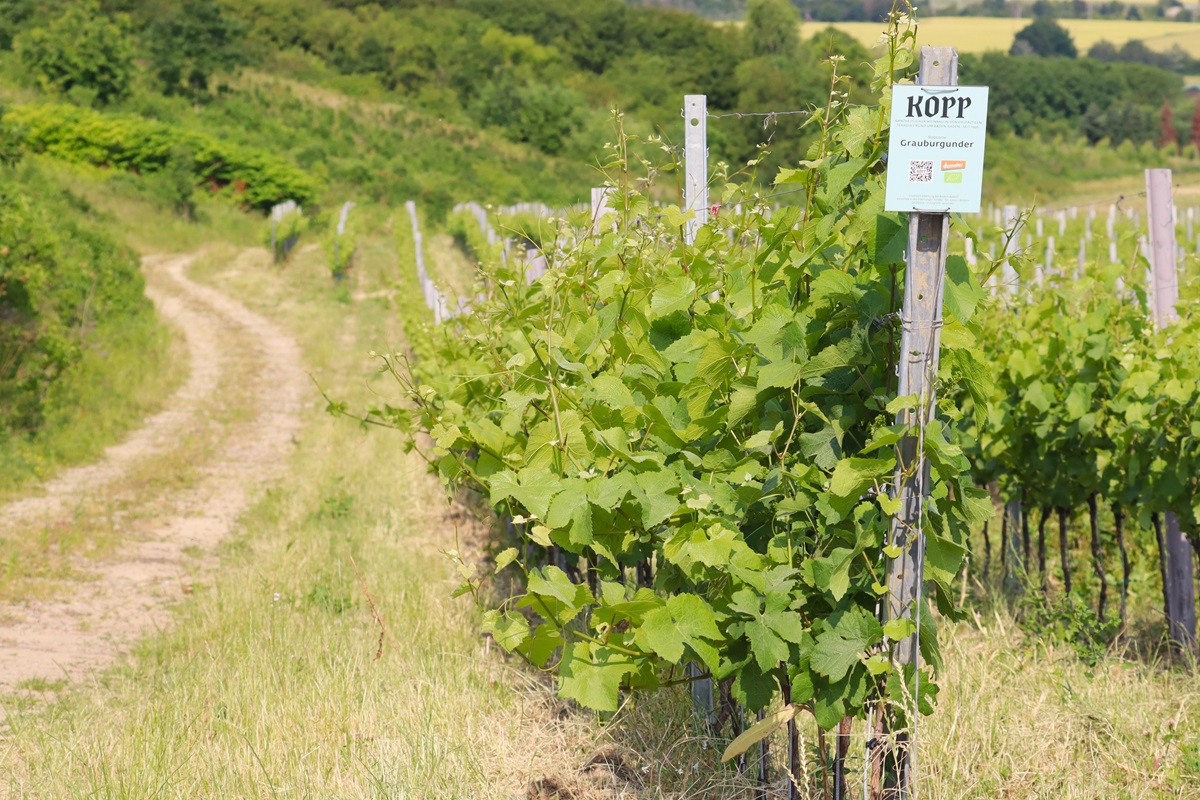
»When starting in 2012 I already stopped using herbicides and mineral fertilizers. I had learned about biodynamic viticulture at the Bürklin-Wolf winery in the Palatinate, and I wanted to work as gently, as close to nature as possible.« Gradually, Johannes was also able to acquire well-located plots from other winegrowers. The winery now has 32 hectares of vineyards.
A perfect combination
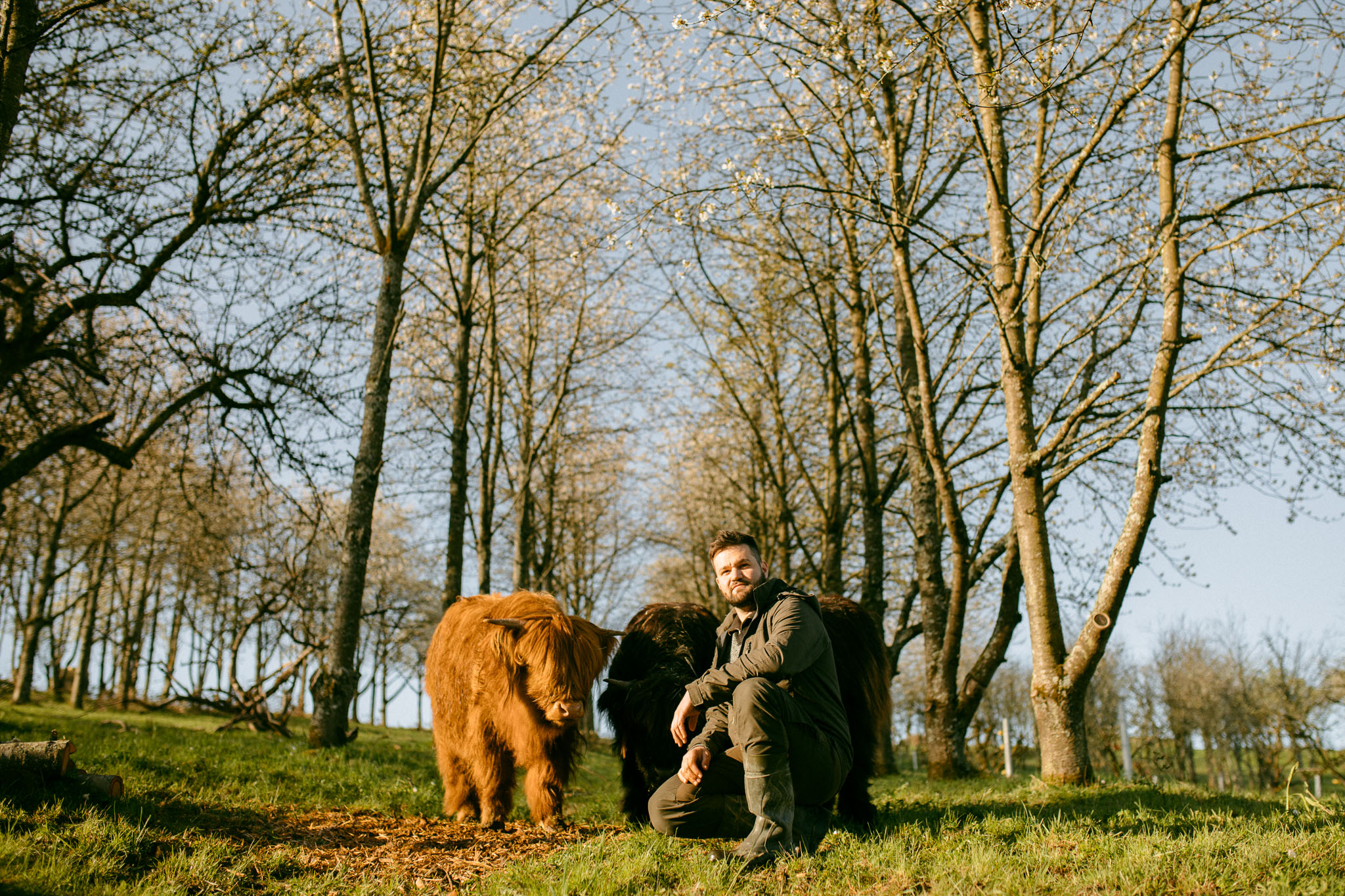
In 2015, new residents moved onto the farm, a small herd of highland cattle. Not primarily for business reasons, however, but for landscape conservation. While the south-facing slopes in the region are used for winegrowing, the north side traditionally had fruit trees in a loose meadow landscape. The highland cattle, as notorious grass lovers, are ideal for preventing these orchards from becoming overgrown.
The last few years have been characterized by major renovations. The new farm building now stands on a hilltop directly above the vines. Rainwater cisterns, a photovoltaic system and a wood pellet heating system have also been built. In this way, the Kopps are virtually self-sufficient.
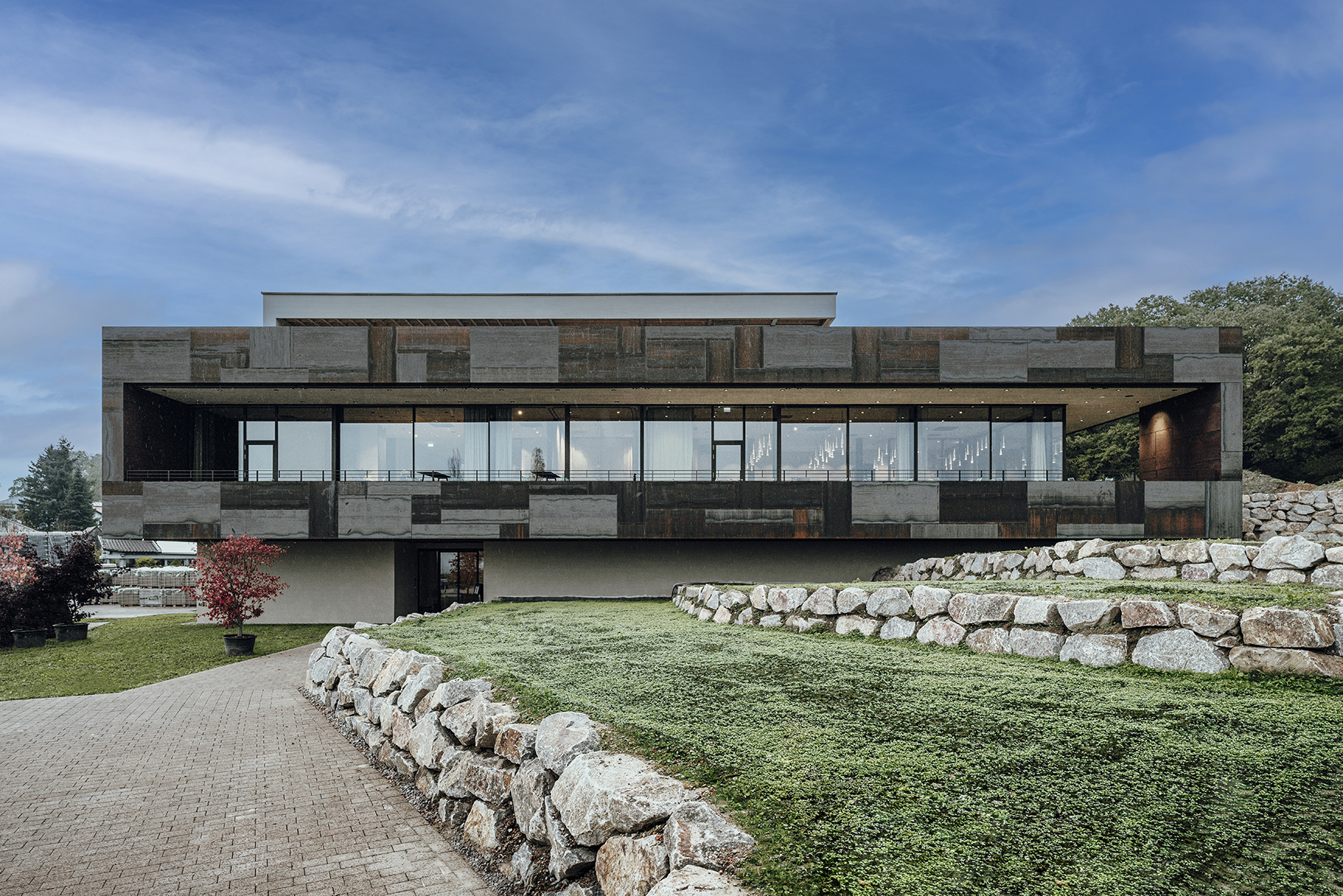
Something else that sets the winery apart from others: The terrace with its sweeping views of the countryside is occupied by its own restaurant named Ebanat. Johannes explains that he got the inspiration for this on an »educational trip«. »I visited wineries in South Africa and saw that some of them had completely different concepts and ideas than us with our purely agricultural business. That fascinated me.« However, it still took a long four years of going through the approval process (after all, we live in a highly bureaucratized, er, organized country). But since 2022 everything has been ready for curious wine and gourmet tourists.
Wine philosophy
I have already mentioned that the winery’s vineyards are certified organic and biodynamic. This means for example that the rows between the vines are greened, and everything is integrated into the so-called farm cycle. This philosophy continues in the cellar. »Basically,« Johannes explains, »we can only work with so little intervention during vinification because we have made sure that everything outside grows as healthy and resilient as possible. All of our musts ferment with natural yeasts, we don’t use enzymes or fining agents and most of the wines are also unfiltered.«
But there is another characteristic, which is why I deliberately used the term »cool climate« in the title. Of course, it is indeed somewhat cooler here than in Burgundy and even more so than in Spain, Italy or the Napa Valley. But the Kopps also follow the philosophy of wines rich in tension. The grapes are harvested when physiologically ripe, but with moderate sugar levels. As a result, the wines remain taut, precise and rather lean in alcohol, a style that is highly sought-after in the upmarket sommellerie and among aficionados.
But now finally to the wines themselves, or more precisely, to the Pinot Noirs. If one wants to get an overview, everything that is produced here can be found in the winery’s webshop.
All Pinot Noirs
Johannes and Alina Kopp have adopted the Burgundian designation principle at their winery. The generic wines from their own vineyards are called Gutswein, followed by the Terroirwein as a kind of village category. Finally, there are the Erste Lage, which correspond to the Premier Cru, and at the very top the Grand Cru, the Große Lage.
Gutswein / Terroirwein
Kopp Spätburgunder
Already spontaneously fermented, matured for 18-20 months in large wooden barrels (Fuder). Wow, this is a wonderfully hearty entry! Lots of red currant, a really serious cool climate wine for little money.
Kopp Spätburgunder Roter Porphyr
Vines over 45 years old, red rock of volcanic origin, matured in French barriques, unfiltered. More open on the nose than the estate wine, more black cherry, stronger barrel influence à la Oregon, fine acidity, elegant.
Erste Lage
Kopp Spätburgunder Sommerhalde
Vines up to 40 years old, red porphyr, silicon-rich rock, matured for 22 months in French barriques, unfiltered. Balsamic, almost ethereal on the nose, much more velvety in texture than the »little ones«, more density and depth.
Kopp Spätburgunder Sonnenberg
25-year-old vines, fertile, loess-rich subsoil, matured for 22 months in French barriques, unfiltered. Quiet and deep, black wild cherry and forest floor, reminiscent of the spruce forest next door.
Kopp Spätburgunder Balzenberg
Vines planted in 2017, a recultivation project of a once famous site directly above Baden-Baden, geologically complex: Rotliegend siltstone, clay slate, hornfels, aged for 24 months in French barriques, unfiltered. Light body, only 12% abv, sour cherry, juniper, extremely fine-grained tannin, as if a room had been lined with velvet. Already pretty fascinating in its subtle style.
Große Lage
Kopp Spätburgunder Felsenstück
Newly planted on the steepest and rockiest parcel, sélection massale, and once again the complex geology so typical of German mountain ranges such as the Black Forest: arkose sandstone, claystone and slate, interspersed with small coal seams. Cold maceration and maturation for 24 months in French barriques, bottled unfiltered. Indeed, a wine from the rock, sublime, cool, still closed, but one begins to sense its density and depth. If you want to drink this noble giant now, you should let it breathe beforehand.
Conclusion
Johannes and Alina Kopp make wines the way I love them. If one wants to compare these Pinot Noirs with anything, the new Sonoma Coast Pinots come to mind, which also convey this spherical »flavor without weight« feeling. The wines are sometimes a bit taut at first, almost intellectual, and there’s still something coniferous floating alongside the fruit, the fir tree tops swaying in the wind.
My verdict: Anyone who has even the slightest interest in the delicate precision of cool climate should definitely try these reds from the Black Forest.
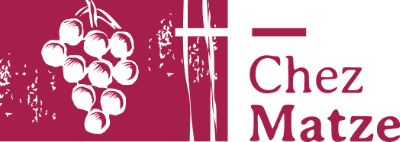




Das Weingut Zaiß in Schützingen solltest du mal besuchen!
Danke für den Hinweis – aber das ist schon ne andere Liga… 😉
Wie wäre es einmal die besten Spätburgunder aus Franken vorzustellen?
Spätburgunder Newcomer!
Das wäre doch auch mal ein interessantes Thema.
Absolut! Churfranken ist da schon sehr gut aufgestellt, finde ich, während sich die anderen irgendwie noch ein bisschen schwer tun. Aber gerade die Newcomer-Sache fände ich auch spannend.